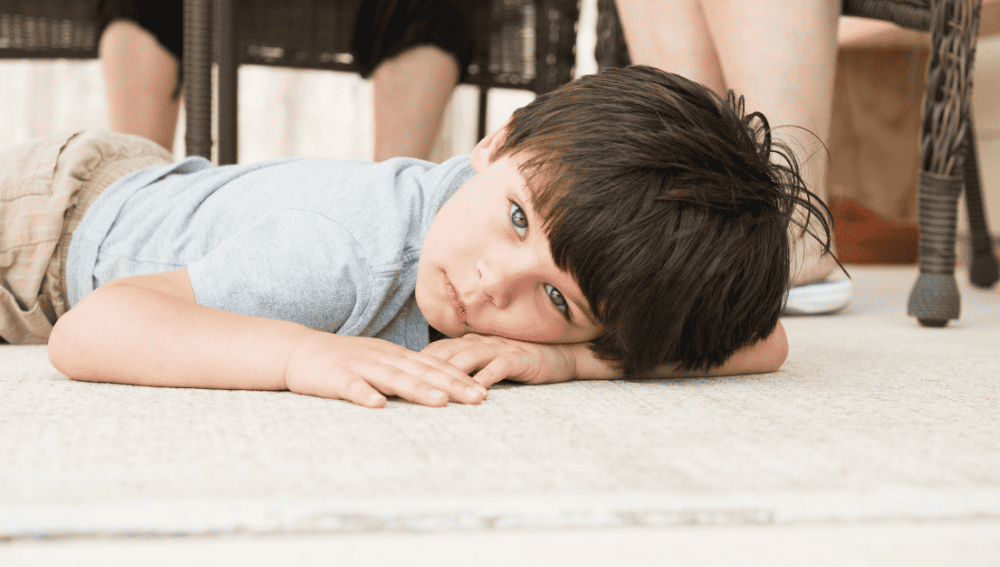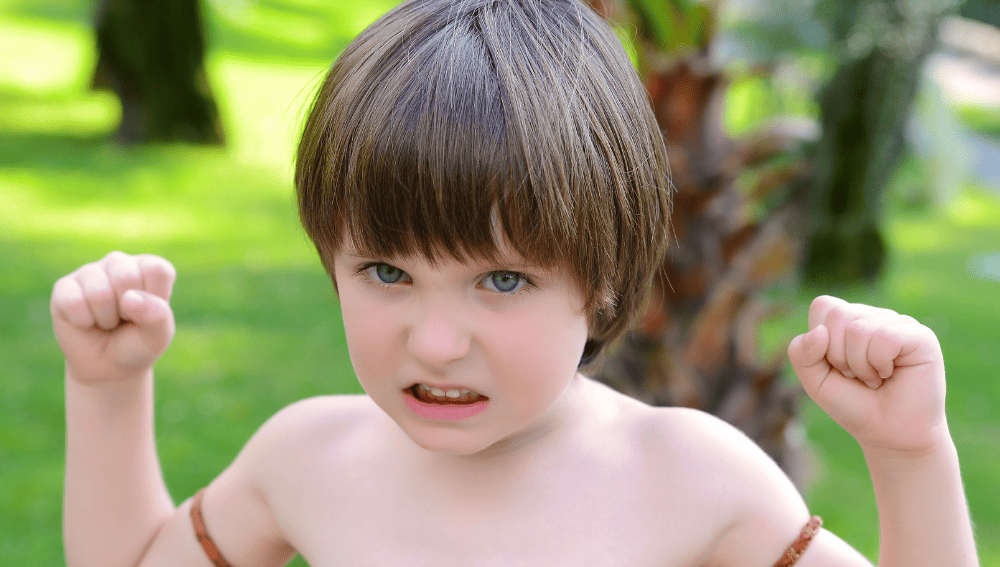Related: Terrible 3s
Hitting is a common behavior among three-year-olds at preschool. It can be alarming for parents and teachers alike, but it is a normal part of child development. Understanding the reasons behind hitting and how to manage it can help prevent it from becoming a recurring problem.
There are many reasons why a three-year-old may hit at preschool. It could be due to frustration, lack of communication skills, or even a desire for attention. Recognizing the triggers for hitting can help parents and teachers address the behavior in a more effective manner.
It is important for parents and teachers to work together to manage and redirect aggressive behavior in three-year-olds. Professional intervention and advice can also be helpful in dealing with specific incidents, such as biting and hitting.
With the right strategies and support, parents and teachers can help three-year-olds develop positive behavior and self-control.
Key Takeaways
- Hitting is a common behavior among three-year-olds at preschool, but it is a normal part of child development.
- Recognizing the triggers for hitting and understanding the reasons behind it can help parents and teachers address the behavior more effectively.
- Working together to manage and redirect aggressive behavior, seeking professional advice, and promoting positive behavior and self-control can help three-year-olds develop social skills and prevent hitting from becoming a recurring problem.
Understanding the Behavior of Three-Year-Olds
Three-year-olds are in a stage of rapid development, both physically and mentally. They are learning to navigate the world around them and are still developing their ability to communicate effectively.
As a result, they may resort to hitting or other aggressive behaviors when they are feeling frustrated or overwhelmed.
At this age, children are also testing their limits and asserting their independence. They may push boundaries and challenge authority figures as they learn to assert their own autonomy.
This can lead to conflicts with other children or adults, which may result in hitting or other aggressive behaviors.
It’s important to remember that toddlers are still developing their emotional regulation skills. They may not have the language skills to express their feelings in a constructive way, which can lead to acting out physically.
It’s important for caregivers and teachers to model appropriate emotional regulation and help children learn to express their feelings in a healthy way.
When dealing with hitting or other aggressive behaviors in three-year-olds, it’s important to consider the child’s developmental age and temperament.
Some children may be more prone to aggressive behaviors due to their temperament, while others may simply need more guidance and support to learn appropriate social skills.
Language development is also a key factor in understanding the behavior of three-year-olds. Children who are still developing their language skills may have difficulty expressing themselves verbally, which can lead to frustration and acting out physically.
Overall, understanding the behavior of three-year-olds requires a nuanced approach that takes into account their developmental stage, emotions, temperament, and language skills.
By providing a supportive and nurturing environment, caregivers and teachers can help children learn to express themselves in healthy and constructive ways.
Reasons Behind Hitting at Preschool
Hitting is a common behavior in preschool-aged children, and it can be a challenging issue for both parents and teachers. There are several reasons why a three-year-old might hit others at preschool, including:
Attention Seeking
Some children hit others to get attention from teachers or peers. They may feel ignored or left out and believe that hitting will help them get noticed. In some cases, children may also hit others to get a reaction from adults.
Frustration
Preschoolers may become frustrated when they are unable to express their emotions or communicate their needs effectively. This frustration can lead to hitting, especially if they feel that their needs are not being met.
Physical Development
Three-year-olds are still developing their motor skills and may not have the control to avoid hitting others accidentally. They may also hit others when they are playing or exploring their environment, not realizing that their actions can hurt others.
Triggers
Certain situations or events can trigger hitting in preschoolers. For example, changes in routine or transitions between activities can be challenging for some children and may lead to hitting.
Similarly, if a child is tired, hungry, or feeling unwell, they may be more likely to hit others.
Jealousy
Preschoolers may hit others out of jealousy, especially if they see others getting attention or receiving something they want. They may also hit others if they feel that their possessions or personal space are being invaded.
Hurt
Finally, some children may hit others if they have been hurt themselves. They may feel angry or upset and lash out at others as a result.
Overall, it is important for parents and teachers to understand the reasons behind hitting in preschoolers. By identifying the triggers and addressing the underlying causes of hitting, adults can help children learn more appropriate ways to express their emotions and communicate their needs.
Recognizing Aggressive Behavior
Recognizing aggressive behavior in toddlers can be challenging, especially when they are not yet able to express themselves through words. However, it is essential to identify early signs of aggressive behaviors to prevent them from escalating into bullying or violence.
Some common signs of aggressive behavior in toddlers include hitting, biting, kicking, pushing, and throwing objects.
Toddlers may also exhibit aggressive behaviors when they are frustrated, angry, or feeling threatened. It is crucial to pay attention to these behaviors and identify the triggers that lead to them.
Parents and caregivers can help prevent aggressive behaviors in toddlers by teaching them appropriate ways to express themselves.
This includes teaching them how to use words to communicate their feelings and encourage positive behaviors such as sharing and taking turns.
It is also essential to provide a safe and nurturing environment for toddlers to help them feel secure and reduce their anxiety levels. This can include setting clear boundaries, providing positive reinforcement for good behavior, and modeling appropriate behaviors.
In conclusion, recognizing aggressive behaviors in toddlers is essential to prevent them from escalating into bullying or violence.
Parents and caregivers can take steps to prevent aggressive behaviors by teaching toddlers appropriate ways to express themselves and providing a safe and nurturing environment.
Role of Emotions and Feelings
Emotions and feelings play a significant role in a child’s behavior, including hitting at preschool. A three-year-old child is still learning to regulate their emotions, and they may not have the ability to communicate their feelings effectively.
When a child is upset or stressed, they may hit or lash out as a way of expressing their emotions.
Empathy is also an essential aspect to consider when dealing with a child who hits at preschool. Teachers and caregivers need to understand the child’s feelings and emotions to help them regulate their behavior.
By acknowledging the child’s emotions, teachers can help them feel heard and understood, which can help reduce the likelihood of hitting.
It’s important to note that hitting is not always a result of negative emotions. Sometimes, a child may hit as a way of expressing excitement or joy. In such cases, teachers can redirect the child’s behavior by providing alternative ways of expressing their emotions.
In conclusion, emotions and feelings are critical factors to consider when dealing with a child who hits at preschool. By understanding and acknowledging the child’s emotions, teachers can help them regulate their behavior and provide alternative ways of expressing their feelings.
Parental Influence and Strategies
When a child hits others at preschool, it is important for parents to understand their role in addressing this behavior. Parental influence can significantly impact a child’s behavior, and strategies can be implemented to help the child learn how to interact with others in a positive manner.
Effective discipline strategies can help children learn from their mistakes and understand the consequences of their actions.
Parents can set clear boundaries and expectations for their child’s behavior, and consistently enforce them. This can help the child understand what is expected of them and reduce the likelihood of hitting behavior.
Communication is also key in addressing hitting behavior. Parents can talk to their child about why hitting is not acceptable and help them understand how it affects others.
They can also work with their child’s preschool teacher to develop a plan for addressing the behavior.
Modeling positive behavior is another important strategy. When parents model respectful and kind behavior towards others, their child is more likely to follow suit.
Parents can also use positive reinforcement to encourage their child’s positive behavior, such as praising them for sharing or being kind to others.
Overall, parents can play a significant role in addressing hitting behavior at preschool. By implementing effective strategies and modeling positive behavior, they can help their child learn how to interact with others in a respectful and kind manner.
Professional Intervention and Advice
When a child exhibits aggressive behavior, it is important to seek professional intervention and advice. There are several types of professionals who can provide guidance and support for parents and caregivers in dealing with a child who hits at preschool.
Pediatricians can provide medical advice and guidance on child development. They can assess a child’s physical health and recommend interventions to address any underlying medical issues that may be contributing to the child’s behavior.
Child psychologists specialize in working with children and can provide assessments and interventions to address behavioral issues. They can help parents and caregivers understand the reasons behind the child’s hitting behavior and develop strategies to manage and prevent it.
Clinical psychologists can provide more specialized interventions for children with more severe behavioral issues. They can work with families to develop behavior plans and provide ongoing support and guidance.
Healthcare providers, including nurses and social workers, can provide support and referrals to other professionals as needed. They can also provide guidance on resources and services available in the community.
It is important to seek professional intervention and advice early on when a child exhibits aggressive behavior. With the right guidance and support, parents and caregivers can help their child learn to manage their emotions and behaviors in a healthy and positive way.
Managing and Redirecting Aggressive Behavior
When a 3-year-old child hits others at preschool, it can be a challenging situation for both the child and the caregivers. It is essential to manage and redirect the aggressive behavior to ensure the safety and well-being of all children in the classroom.
One of the first steps in managing aggressive behavior is to remain calm and neutral. Caregivers should avoid reacting emotionally or physically to the child’s behavior. Instead, they should approach the child calmly and provide clear and concise instructions.
If the child continues to hit others, the caregiver may need to remove the child from the situation. This may involve physically restraining the child or separating them from the other children. In some cases, a timeout may be necessary to allow the child to calm down and reflect on their behavior.
It is also essential to provide consequences for the child’s actions. This may involve a loss of privileges or a discussion about how their behavior affects others.
Caregivers should be consistent in their approach to consequences and ensure that they are appropriate for the child’s age and developmental level.
Redirection can be an effective strategy for managing aggressive behavior. Caregivers can redirect the child’s attention to a different activity or provide them with an alternative way to express their emotions.
For example, the child may be encouraged to draw or use a stress ball to release their anger or frustration.
Interventions may be necessary for children who continue to exhibit aggressive behavior. This may involve working with a mental health professional or implementing a behavior plan to address the child’s specific needs.
Overall, managing and redirecting aggressive behavior in a 3-year-old child requires a confident and knowledgeable approach.
Caregivers must remain calm and neutral, provide appropriate consequences, and use redirection and alternative strategies to help the child learn appropriate ways to express their emotions.
Enhancing Social Skills and Peer Interaction
Enhancing social skills and peer interaction is an essential aspect of a child’s development, especially in preschool.
Children who have difficulty interacting with their peers may exhibit challenging behaviors such as hitting, biting, or pushing. Therefore, it is important to teach children social skills and how to interact with their peers positively.
One effective way to enhance social skills and peer interaction is through play. Play provides children with opportunities to learn how to take turns, share, and cooperate with others, which are critical skills for social interaction.
Teachers can encourage children to engage in group activities that promote social skills, such as board games, puzzles, and building blocks.
Another way to enhance social skills is through social stories. Social stories are short stories that teach children how to behave in social situations.
Teachers can use social stories to teach children how to greet their peers, share toys, and take turns. Social stories can also help children understand the consequences of their actions, such as hitting or pushing.
Playdates are also an excellent way to enhance social skills and peer interaction. Playdates provide children with opportunities to interact with their peers in a more relaxed setting, which can help build friendships and improve social skills.
Teachers can encourage parents to arrange playdates for their children and provide them with tips on how to facilitate positive interactions.
In conclusion, enhancing social skills and peer interaction is critical for a child’s development, especially in preschool.
Teachers can use play, social stories, and playdates to teach children social skills and how to interact positively with their peers. By doing so, children can develop strong social skills that will benefit them throughout their lives.
Importance of Routine and Environment
A consistent routine and a positive environment are crucial for the development of a child, especially in a preschool setting. It is important to create a structured routine that includes playtime, naps, and snacks. This will help children feel safe and secure, and will also help them learn and grow.
Playtime is an essential part of a child’s day. It allows them to explore their surroundings, develop their social skills, and learn new things.
During playtime, children should be encouraged to interact with each other and engage in activities that promote creativity, problem-solving, and physical activity.
Naps are also important for a child’s development. They help children recharge and refocus, which can lead to better behavior and improved learning.
It is important to create a quiet and comfortable environment for naps, and to make sure that children have a consistent nap schedule.
Snacks are another important part of a child’s day. They provide children with the energy they need to learn and play, and also help them develop healthy eating habits.
It is important to provide nutritious snacks that are easy for children to eat, such as fresh fruit, vegetables, and crackers.
Overall, a consistent routine and a positive environment are essential for the development of a child in a preschool setting.
By providing children with a structured routine that includes playtime, naps, and snacks, they will feel safe and secure, and will be able to learn and grow to their full potential.
Promoting Positive Behavior and Self-Control
At preschool, it is not uncommon for three-year-olds to hit or engage in other aggressive behaviors. However, it is important to promote positive behavior and self-control in these young children to prevent these behaviors from becoming a habit.
One effective way to promote positive behavior is to use positive reinforcement. When a child exhibits positive behavior such as sharing or using kind words, praise and reward them.
This can be as simple as a verbal compliment or a sticker on a chart. Positive reinforcement encourages children to continue exhibiting positive behavior.
Teaching emotional regulation and impulse control is also important. Children need to learn how to identify and manage their emotions in a healthy way.
Teachers and caregivers can help children learn these skills by providing a safe and supportive environment where they can express their emotions and practice self-regulation.
Another proactive approach is to teach children how to apologize. When a child hits or engages in other negative behaviors, it is important for them to understand the impact of their actions and take responsibility for them.
Teaching children how to apologize can help them develop empathy and take steps to repair relationships.
Overall, promoting positive behavior and self-control in three-year-olds requires a combination of positive reinforcement, emotional regulation, impulse control, and proactive teaching of social skills such as apologizing.
By implementing these strategies, teachers and caregivers can help young children develop healthy habits and prevent aggressive behaviors from becoming a pattern.
Dealing with Specific Incidents: Biting and Hitting
Biting and hitting are common behaviors among toddlers and preschoolers. While it is normal for young children to experiment with different forms of physical expression, it is important for caregivers and educators to address these behaviors promptly and appropriately.
Here are some tips for dealing with specific incidents of biting and hitting:
Biting
Biting is a behavior that can be triggered by a number of factors, including frustration, overstimulation, and teething. When a child bites another child, it is important to respond calmly and firmly.
Here are some steps to take:
- Separate the children involved and attend to the victim first.
- Comfort the child who was bitten and check for any injuries.
- Explain to the child who bit that biting hurts and is not okay.
- Help the child who bit find alternative ways to express their emotions, such as using words or taking a break.
- Follow up with the parents of both children involved to inform them of the incident and discuss any necessary actions.
Hitting
Hitting is another behavior that can be triggered by various factors, such as frustration, anger, and lack of impulse control. When a child hits another child, it is important to respond quickly and firmly. Here are some steps to take:
- Separate the children involved and attend to the victim first.
- Explain to the child who hit that hitting hurts and is not okay.
- Help the child who hit find alternative ways to express their emotions, such as using words or taking a break.
- Encourage the child who hit to apologize to the victim.
- Follow up with the parents of both children involved to inform them of the incident and discuss any necessary actions.
In both cases, it is important for caregivers and educators to remain calm and avoid using physical punishment or shaming. It is also important to provide positive reinforcement when children use appropriate behavior to express their emotions.
By addressing biting and hitting incidents promptly and appropriately, caregivers and educators can help young children learn to communicate and interact with others in a positive way.
Frequently Asked Questions
How can I help my 3-year-old stop hitting at preschool?
Parents can help their 3-year-old stop hitting at preschool by teaching them appropriate ways to express their feelings. Parents can encourage their child to use words to express themselves instead of hitting.
It is also important to model appropriate behavior for their child.
What are some strategies to prevent my 3-year-old from hitting others?
Parents can prevent their 3-year-old from hitting others by teaching them social skills such as sharing, taking turns, and problem-solving. Parents can also provide positive reinforcement when their child uses appropriate behavior.
What are the possible reasons for my 3-year-old’s aggressive behavior at preschool?
There are several possible reasons for a 3-year-old’s aggressive behavior at preschool. It could be due to frustration, lack of social skills, or a need for attention. It is important to observe and identify the cause of the behavior to address it effectively.
Is it common for 3-year-olds to hit at preschool?
Yes, it is common for 3-year-olds to hit at preschool. It is a normal part of their development as they learn to navigate social situations and express their emotions.
How can I communicate with my child’s preschool about their hitting behavior?
Parents can communicate with their child’s preschool by setting up a meeting with the teacher or director. It is important to approach the situation in a non-judgmental and collaborative manner to find a solution that works for the child, parents, and school.
What are some consequences that can be effective for a 3-year-old who hits at preschool?
Effective consequences for a 3-year-old who hits at preschool may include time-out, loss of privileges, or redirection to a positive activity. It is important to use consequences that are age-appropriate and consistent to reinforce appropriate behavior.
Related Post: Can I Stop My Child From Seeing Her Grandparents?

Iesha is a loving mother of 2 beautiful children. She’s an active parent who enjoys indoor and outdoor adventures with her family. Her mission is to share practical and realistic parenting advice to help the parenting community becoming stronger.




